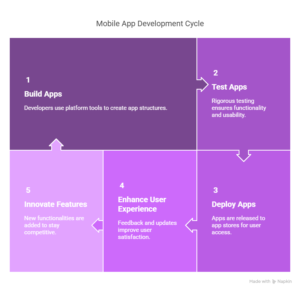
Quality Assurance and Software Testing Services
Ensuring Your Software Works, Always
Ensuring Your Software Works, Always
To find and fix software faults and bugs, apply strict quality assurance (QA) testing procedures. Our team specializes in rigorous quality assurance testing, making sure your program is dependable and free of errors from the start.
To find and reduce possible security threats, conduct frequent security audits, penetration tests, and vulnerability assessments. Proactive risk reduction techniques and thorough security-focused QA testing are offered by our cybersecurity specialists.
Conduct QA-driven scalability analyses to ensure your program can accommodate increasing user bases and higher loads. Our team offers scalability testing and optimization services, ensuring your software scales flawlessly.
To ensure seamless operation and less down time, thoroughly test and validate third-party integrations. Our proficiency in quality assurance testing and third-party service integration ensures a seamless and effective integration process.
To improve user experiences, find and fix performance bottlenecks using QA-driven testing. Our professionals are skilled in performance optimization, so you can be sure that your program operates at its optimum level.
Use QA testing when implementing upgrades and releases to avoid new problems and guarantee a smooth transition. Quality is given priority through QA testing throughout our end-to-end support for significant changes and releases, from planning to testing and deployment.
To get better ROI, our experts align customer needs with your business goals.
01/09
Analyze project requirements and plan testing strategies.
02/09
Create detailed test cases and scripts, covering various scenarios.
03/09
Execute test cases, record results, and report defects.
04/09
Log and prioritize defects, collaborating for resolution.
05/09
Assess software performance and security, optimizing and mitigating risks.
06/09
Involve users for acceptance testing and feedback.
07/09
Maintain comprehensive documentation and continuously improve processes.
08/09
Review objectives, prepare summaries, and gain stakeholder approval.
09/09
Continuously monitor and address production issues while planning updates.
As part of our commitment to inclusivity, we ensure your software is accessible to users with impairments.
We use effective automated scripts to automate your testing procedures, saving you time and effort by expediting the development lifecycle.
Our experts ensure that your program operates without any issue across a variety of devices and platforms, giving users a consistent experience and extending your reach.
To ensure a dependable and consistent user experience, we test software compatibility across a range of web browsers.
Accuracy and integrity of the data are our top concerns. We thoroughly verify the data in your software to make sure it provides trustworthy insights.
To ensure that your software satisfies specific requirements and operates flawlessly, increasing user happiness, our professionals carry out thorough functional testing.
To avoid interruptions, we proactively detect performance bottlenecks by evaluating how your program responds to high user loads.
Our evaluations of your software’s preparedness for a variety of worldwide markets take linguistic and cultural factors into account.
We are specialized in testing mobile apps for iOS and Android, to ensure your program runs smoothly on both systems.
With our team’s expertise, we ensure your software runs seamlessly even under demanding circumstances. We can optimize its performance in a variety of circumstances.
An important part of our design process is prototyping. We develop low-fidelity to high-fidelity prototypes for A/B testing and user testing, iterating designs in response to actual user input.
To preserve software stability and make sure that any code modifications don’t cause unforeseen problems, we carefully carry out regression testing with an acute attention to detail.
Our primary objective is keeping your software safe. Our expertise lies in security testing; we carefully find and fix flaws to protect user data and your own data.
By carrying out usability testing, we put the user experience first. Our observations assist in improving the usability of your program so that it appeals to your intended market.
By ensuring that your software conforms with industry norms and laws, our professionals lower the risks associated with noncompliance.
By facilitating UAT, we ensure that your product satisfies real-world requirements and expectations by bridging the gap between development and end users.
By identifying unforeseen problems, our exploratory testing makes sure your program is resilient to unforeseen setbacks.
Our code reviews assist to keep your product stable and maintainable over time by spotting potential issues and maintaining code quality.
We ensure that your resources are focused where they matter most by prioritising testing efforts based on acknowledged risks.
To improve reliability of your product, we examine the documentation and code for errors.
We make sure that quality is upheld throughout the lifecycle of your software by seamlessly integrating automated testing into your development process.
Through joint efforts, our team of technical and management specialists can expedite your projects.
Access to the top 2% of technical specialists for projects with shorter time-to-market that offer stability and scalability.
Reduce risk and maximise project optimization to ensure quality and on-time/budget delivery.
QA is a structured process that identifies and address errors and defects in software to ensure its functionality, quality, and reliability.
By ensuring that software fulfills user expectations, works as intended, and is free of serious flaws, quality assurance (QA) eventually raises user satisfaction and lowers post-release problems.
Quality assurance strengthens customer trust, reduces development costs, speeds up time to market, and improves product quality.
Whereas QC is concerned with finding and fixing errors, QA focuses on preventing errors. Whereas QC is reactive, QA is proactive.
Quality assurance (QA) includes a range of testing methods, such as usability, functional, regression, performance, and security testing.
Get exclusive insights, curated resources and expert guidance
Business Hub DHA Phase 8 Lahore
© 2024 | All rights reserved.